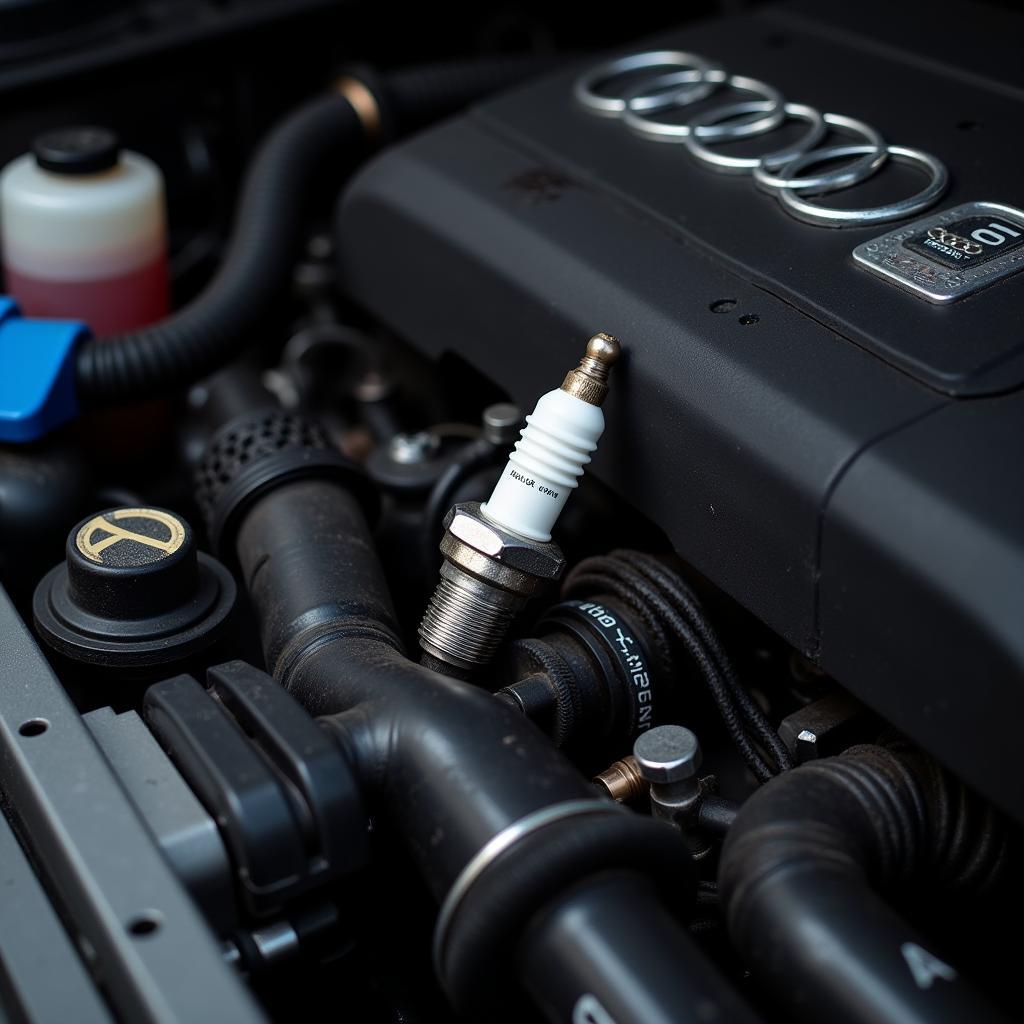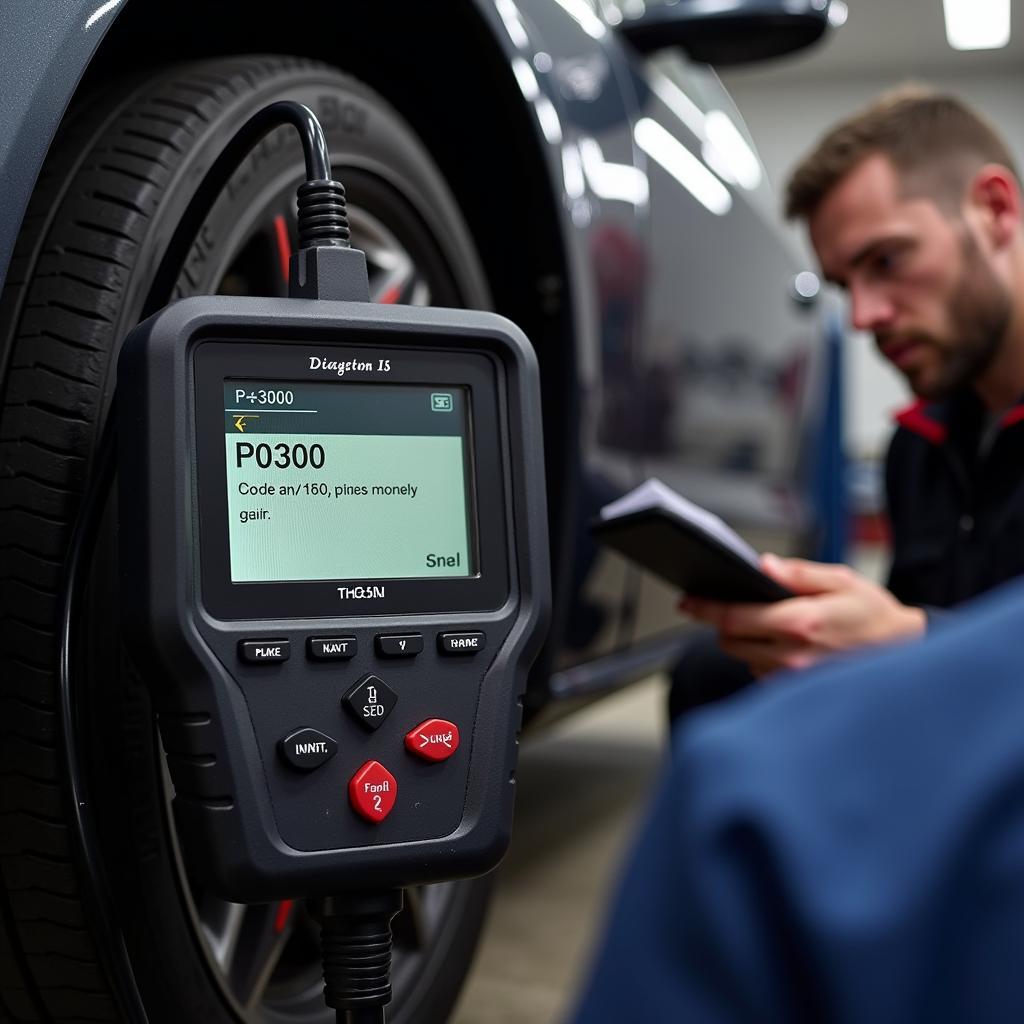Your cart is currently empty!

Understanding and Fixing Audi OBD Fault Code P0300
The dreaded check engine light can induce panic in any Audi owner. When this light is accompanied by sluggish performance, rough idling, or decreased fuel efficiency, the culprit might be the cryptic Audi OBD fault code P0300. This code indicates a random or multiple cylinder misfire, a common yet potentially complex issue. This comprehensive guide will equip you with the knowledge to understand, diagnose, and potentially fix the P0300 code in your Audi.
What Does the P0300 Code Mean?
In simple terms, the P0300 code signifies that your Audi’s engine control unit (ECU) has detected a misfire in one or more cylinders. A misfire occurs when the air-fuel mixture in a cylinder fails to ignite properly, disrupting the engine’s combustion cycle. While the code itself doesn’t pinpoint the exact cause, it sets the stage for a thorough investigation.
 Audi engine experiencing misfire
Audi engine experiencing misfire
Common Causes of P0300 in Audis
A myriad of issues can trigger the P0300 code in Audis. Here are some of the most prevalent culprits:
- Worn Spark Plugs: Spark plugs are essential for igniting the air-fuel mixture. Over time, they wear down, leading to weak sparks or misfires.
- Faulty Ignition Coils: Ignition coils provide the high voltage necessary for spark plugs to fire. A failing coil can disrupt this process, causing a misfire in the corresponding cylinder.
- Vacuum Leaks: Any leaks in the intake manifold or vacuum hoses can disrupt the air-fuel ratio, leading to misfires.
- Fuel System Issues: Problems with fuel injectors, fuel pressure regulator, or a clogged fuel filter can result in an incorrect air-fuel mixture, triggering the P0300 code.
- Sensor Malfunctions: Faulty sensors, such as the mass airflow sensor (MAF), manifold absolute pressure sensor (MAP), or oxygen sensors, can send incorrect data to the ECU, leading to misfires.
Diagnosing the P0300 Code
Diagnosing the root cause of the P0300 code requires a systematic approach:
- Read the Code: Begin by connecting an OBD-II scanner to your Audi’s diagnostic port and retrieving the stored code.
- Inspect the Spark Plugs: Visually inspect the spark plugs for wear and tear, such as excessive gaps, cracks, or deposits.
- Check for Vacuum Leaks: Inspect the intake manifold and vacuum hoses for any signs of leaks, cracks, or loose connections.
- Test the Ignition System: Use a multimeter to test the resistance of the ignition coils and check for spark at each cylinder.
- Inspect Fuel System Components: Check the fuel injectors for clogging or leaks, examine the fuel pressure regulator, and inspect the fuel filter.
- Evaluate Sensor Data: If the basic checks don’t reveal the issue, use an OBD-II scanner to monitor live data from various sensors like the MAF, MAP, and oxygen sensors.
 Diagnosing P0300 with OBD-II scanner
Diagnosing P0300 with OBD-II scanner
Fixing the P0300 Code in your Audi
Once you’ve identified the root cause of the P0300 code, take the following steps to rectify the issue:
- Replace Worn Spark Plugs: If the spark plugs are worn out, replace them with the manufacturer-recommended parts.
- Replace Faulty Ignition Coils: If an ignition coil is faulty, replace it with a new one. Consider replacing all coils simultaneously if they have considerable mileage.
- Repair Vacuum Leaks: Seal any leaks in the intake manifold or vacuum hoses using appropriate sealant or replace the affected components.
- Address Fuel System Problems: Clean or replace clogged fuel injectors, replace a faulty fuel pressure regulator, or change the fuel filter.
- Replace Malfunctioning Sensors: If any sensors are sending incorrect data, replace them with new ones.
Expert Insight: “Always use high-quality OEM or equivalent parts when replacing components in your Audi. Using substandard parts can lead to recurring issues and potentially damage your engine.” – Mark Stevenson, Senior Automotive Engineer at VCDSTool
Preventing Future P0300 Codes
While some causes of P0300 are unavoidable due to wear and tear, you can take proactive measures to prevent future occurrences:
- Adhere to Scheduled Maintenance: Follow your Audi’s recommended maintenance schedule diligently. Regular spark plug replacements, fuel system cleaning, and sensor checks can prevent many issues.
- Use High-Quality Fuel: Opt for high-quality fuel from reputable gas stations. This minimizes the risk of fuel system contamination and ensures optimal combustion.
- Address Issues Promptly: If you experience any unusual engine behavior or warning lights, address them promptly to prevent minor problems from escalating into major ones.
Expert Tip: “Consider using a fuel additive occasionally to help clean fuel injectors and prevent carbon buildup in the combustion chamber.” – Emily Carter, Automotive Technician and Diagnostic Specialist at VCDSTool
Conclusion
The Audi OBD fault code P0300, indicating random or multiple cylinder misfires, can be concerning. However, by understanding its potential causes and following a systematic diagnostic approach, you can pinpoint and resolve the issue. Remember, regular maintenance and prompt attention to warning signs are crucial for preventing future occurrences and keeping your Audi running smoothly. If you’re uncomfortable diagnosing or repairing the problem yourself, seek assistance from a qualified Audi technician or reach out to us at VCDSTool for expert guidance and support.
Contact VCDSTool:
Phone: +1 (641) 206-8880 and our email address: vcdstool@gmail.com
Office: 6719 W 70th Ave, Arvada, CO 80003, USA
FAQ
1. Can I still drive my Audi with a P0300 code?
It’s not advisable to drive your Audi for extended periods with a P0300 code. Continued driving with misfires can damage the catalytic converter and other engine components.
2. How much does it cost to fix the P0300 code?
The cost of repair varies widely depending on the underlying cause. Simple fixes like spark plug replacements can be relatively inexpensive, while complex issues like fuel system repairs can be significantly more costly.
3. Can a bad battery cause a P0300 code?
While a weak battery can potentially contribute to misfires, it’s not a direct cause of the P0300 code.
4. How often should I replace my Audi’s spark plugs?
Consult your owner’s manual for specific recommendations. However, as a general guideline, it’s advisable to replace spark plugs every 30,000 to 60,000 miles.
5. Can I use a generic OBD-II scanner to diagnose the P0300 code?
Yes, a generic OBD-II scanner can retrieve the P0300 code. However, a more advanced scanner might be necessary to access live sensor data for more in-depth diagnostics.
by
Tags:
Leave a Reply